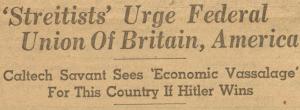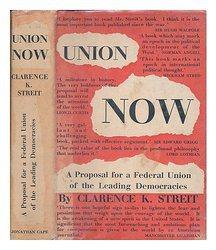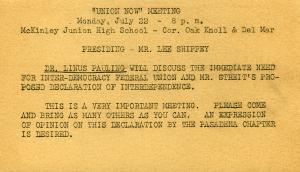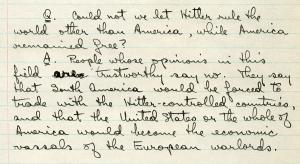
[Part 1 of 3]
The onset of World War II drastically changed the course of Linus Pauling’s career. As was characteristic of much of 20th century warfare, the Second World War took place not only on the battlefield but also in the world’s scientific laboratories, as national governments invested their hopes and resources in the work of scientists and engineers supporting the war effort.
In the early 1940s, Pauling’s focus accordingly shifted from molecular structure towards a broad program of war-related research, including work on a substitute for blood serum and the development of an instrument capable of detecting the partial pressure of oxygen. The war wound up affecting Pauling’s career in many positive ways, but it also complicated the relationship between his personal views and his profession as a scientist.
Until 1940 Pauling had been fairly conventional in his world view; he limited his work to the objective processes of the scientific method and allowed politicians to deal with public affairs. At the suggestion of his wife Ava Helen, however, Linus began to read political theorists and joined organizations that aimed to engage their members in conversations about the issues facing society.
Pauling quickly found himself influenced by the authors that Ava Helen suggested. Interested in presenting his opinions, Pauling took a significant step forward in 1940 by speaking to the Federal Unionist club, an organization that aimed to promote the ideas proposed in Clarence Streit’s book, Union Now, published in 1939.
The talk, which Pauling delivered at a Pasadena junior high school on July 22, 1940, was the first important non-scientific presentation that Pauling had given during his professional career. In many respects, the lecture marked the beginning of Pauling’s public life as an activist.

Clarence Streit’s book proposed that the spread of totalitarian regimes was inevitable unless the world’s democracies – by which he primarily meant English-speaking republics – joined forces to protect their mutual concerns. As such, at a time when it was far from clear that the U.S. would enter into combat, Streit argued that it was in the best interest of the United States to support Great Britain’s struggle against Adolf Hitler in order to protect itself from Hitler’s increasing power.
Moving forward, Streit believed that the world’s democracies would likewise best be served by uniting under one federal government that operated under a “Declaration of Interdependence” and was charged with continuing to insure the collective good of its constituents. Federalist Union clubs, such as the one with which the Paulings were aligned as members, sprung up around the country with the goal of sparking discussion of Streit’s proposals.
Linus and Ava Helen were chief members of the Pasadena Chapter of the Federal Unionist Club and they encouraged the opening of new chapters elsewhere, including at their alma mater, Oregon State College. In many ways, the Federal Unionist Club provided an ideological haven for the couple.
However, even after becoming a member, Linus remained quiet about his political opinions; mainly because he thought of himself as a physical chemist rather than a political thinker. Furthermore, Pauling understood the need to be cautious on matters of public policy – Caltech and Pasadena were both relatively conservative communities at the time, and Streit’s ideas on collective action and, ultimately, world government, were considered liberal by most and radical by some.

Pauling’s 1940 lecture marked a turning point in his public persona. Titled “The Immediate Need for Interdemocracy Federal Union and Mr. Streit’s Proposed Declaration of Interdependence,” the talk was delivered to members of the local Federal Unionist club. The presentation was significant for many reasons: not only did it mark his first non-scientific lecture as a Caltech professional, it also served as the first political statement that he had made before a larger audience.
Previously, Pauling had deemed politics too arbitrary and charged with personal interpretation to present in any objective or even purely informative manner. A scientist first and foremost, Pauling was used to and comfortable with presenting scientific data to his audiences rather than more personal opinions. Ava Helen’s interest and involvement in social and political movements, however, combined with changing times to slowly steer her husband towards a more active role in these types of activities.

Excerpt of Pauling’s preparation for his Union Now talk, July 1940.
Standing in front of his audience at McKinley Junior High School may have evoked in Linus memories of his experiences in college oratory. During his junior year at Oregon Agricultural College, Pauling was chosen as class orator and the following year he delivered the senior class oration, an opportunity that he seized to urge his fellow classmates to take responsibility for the knowledge that they had acquired and to use it for the improvement of society.
This sense of responsibility shone through in his involvement in the Federal Unionist club, an environment which put Pauling in a position to think more deeply about World War II. The war was rapidly becoming the driving force behind his research and it was impossible for Pauling to ignore the political implications of his work. Unlike his past experiences with science-based lectures, the lecture given to the Federal Unionist club allowed Pauling to express his passion for a different type of subject and served to jumpstart a career defined by both scientific research and political involvement.
Union Now was not the only text that influenced Pauling’s shifting attitudes towards political affairs; he had also read The Social Function of Science, authored by his good friend, the English crystallographer and biologist J.D. Bernal. This text helped to further develop Pauling’s ideal of scientists as citizens who are also active contributors to the public’s understanding of science and technology. The engaged scientist as public citizen, Pauling believed, would make an important contribution to the citizenry’s ability to understand and analyze the widespread conflict and political turmoil that developed as a consequence of World War II.
Pauling prepared for his speech well in advance – an extant manuscript dated three and a half months before the lecture suggests that he invested a significant amount of time to thinking and writing about Union Now. And while much of the talk is devoted to a discussion of the details of Streit’s book, Pauling incorporates rhetoric of his own throughout. Near the beginning of the piece, he writes
Now there is being waged a great war between democracy and totalitarianism, to decide between the free way and the slave way. And this war may well determine, as Hitler says it will, the course of the world for the next thousand years. Through the development of methods of transportation and of technology in general, the world has effectively become so small that world rule is to be expected soon. The great decision which will be made before many years – surely during the present century, and possibly within the coming decade – is whether the world will be ruled by totalitarian masters or whether it will be a free democratic state.
When Pauling finally stood before the audience of the Federal Unionist Club and explained Streit’s proposals, it became clear that, through the influence of Ava Helen and the authors that she had introduced, Linus had at last become the scientist that he was indeed destined to be – not just an educated researcher, but also an active citizen. As we continue to explore this idea over the next two posts, we’ll learn more about Clarence Streit the man, as well as Ava Helen Pauling’s active involvement with the Federal Unionists.
